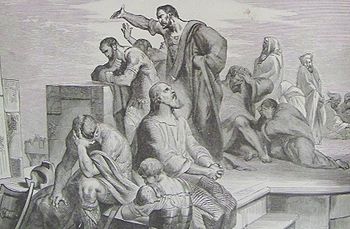من یک یهودی هستم
انا من الیهـــــــــودی
***********
* Torah for the Children
and the Grown also *
* Torah for the Children
and the Grown also *
*******************
HARAV * KOOK *
* TORAH * INSTITUTE
Parashat
* BEHAR *
1
2
3
4
Harav * KOOK * Parashat
* Bechukotai *
1
2
3
**************
God tells Moses to instruct the people in the laws
of the Sabbatical and Jubilee years, as well as how
to relate to those in the community who become
impoverished.
God spoke to Moses on Mount Sinai and
told him to tell the Israelites the following:
When you enter the land that I give you, the land
shall observe a Sabbath of the Lord. Six years you
may sow your field and prune your vineyard and
gather the crops. But in the seventh year the land
shall have a Sabbath of complete rest, a Sabbath of
the Lord. You shall not sow your field, nor prune your
vineyard; it shall be a year of complete rest for the
land. You may eat the Sabbath produce of the land.
God enumerates the rewards for keeping the
commandments and the punishments for
violating them; the laws of tithes are then listed.
God says: If you follow My laws and faithfully observe
My commandments, I will grant rain so that the earth
shall yield its produce and the trees their fruit. I will
grant peace and you shall sleep with no fear. I will
cause vicious beasts to withdraw from the land and
your enemies will fall before you.
I, your God, will look with favor upon you and make you
fertile and multiply. I will establish My covenant with you.
I will place My Sanctuary among you and My Spirit will
not reject you. I will walk among you, I will be God to you,
and you will be a people to Me. I, who broke the bonds
of your slavery and taught you to walk upright.
*********************
Sent by Dalia Shemesh / Israel
Haftarah: Jeremiah
1
This week's haftorah teaches us a profound lesson in trust and faith in Hashem. The prophet Yirmiyahu introduces the haftorah by proclaiming, "Hashem is my strength, my stronghold, my refuge in the day of trouble." Yirmiyahu proceeds and admonishes the Jewish people for pursuing foreign avenues and engaging in strange practices for security. He warns them that they are subject to forfeiting their wealth and possessions because of their public involvement in idolatry.
2
Parashat Behar begins with an extended discussion of the sabbatical year, the last in an ongoing seven-year cycle. During the seventh year the land is given a rest; it is not sown or planted, reaped or pruned. What grows naturally is permissible for use. After seven such seven-year cycles, the fiftieth year is observed as a jubilee. In addition to observing the restrictions associated with the sabbatical year, the jubilee also is marked by the restoration of property to its original owners and by the manumission of Hebrew slaves who have not yet been redeemed from servitude. Sellers and buyers alike are told to be scrupulously fair in real estate transactions, accurately adjusting costs and values as they draw closer to the jubilee.
The Year of Jubilee (painting by Henry Le Jeune)
arashat Behar begins with an extended discussion of the sabbatical year, the last in an ongoing seven-year cycle. During the seventh year the land is given a rest; it is not sown or planted, reaped or pruned. What grows naturally is permissible for use. After seven such seven-year cycles, the fiftieth year is observed as a jubilee. In addition to observing the restrictions associated with the sabbatical year, the jubilee also is marked by the restoration of property to its original owners and by the manumission of Hebrew slaves who have not yet been redeemed from servitude. Sellers and buyers alike are told to be scrupulously fair in real estate transactions, accurately adjusting costs and values as they draw closer to the jubilee
(illustration from the 1890 Holman Bible)
**********************
LATEST HOT NEWS
FROM ISRAEL
Have a nice week
שבוע טוב















No comments:
Post a Comment